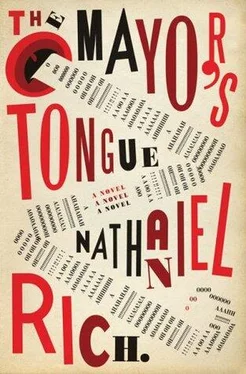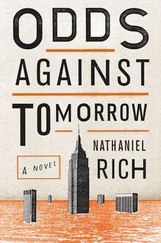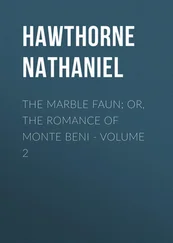"What you're after is unsubstantial, the creation of a human mind. And not your mind, I might add. Your thoughts are not even your own."
Enzo collapsed again, sobbing.
"Well, you may be right," he said. "I'm not myself. I'm not anyone really."
"What's Idaville?" asked Eugene.
"It's the town where you're headed," said Lang. "But don't use that name in any of the villages around here. No one will understand you."
"My love is there," said Enzo. "So I have to go."
Eugene thought of Sonia. She was still strange to him, but he was getting closer, he felt it. He wondered who he would find with her in Idaville. He knew Eakins wasn't there — but who was?
Enzo was making a mess of his trousers, rolling about in the dust and rocks. Eugene grabbed him by his wide, fanciful lapels, and shook hard. Enzo sat up straight and looked at Eugene directly for the first time.
"It's you! But why did you leave me in the street?"
"I thought we were after the same girl."
"It's not Alice he's after," said Lang." Don't worry about that."
Lang spoke with a degree of certainty that seemed to indicate he knew more than he let on. Eugene had an idea.
"Do you know how to get there?" he asked the boy. He had to shake Enzo again to get an answer out of him. "How to get to Idaville?"
"Yes," he gulped. "I lived there once."
"Can you take me there?"
"We'll go together? Please! I think we have something in common."
"That solves it," said Eugene.
He turned to Lang, but the little man was gone. The pine branches rustled and the rocky trail beneath them was silent. Eugene peered over the precipice of the gorge, fearing the worst. But all that he saw below were fiery thickets of juniper shrubs; the quiet Timavo, winding and tumbling down the Carso; the orange roofs of the changeling city and the purple sea beyond.
In the airport bathroom Mr. Schmitz checks his pockets and finds: a postcard from the Bloom Memorial Gardens ("Welcome to the Rest of Your Afterlife"), a money clip, a boarding pass, a white silk yarmulke, a passport — and a torn envelope, containing a letter from Rutherford. He holds the paper up to the fluorescent glare of the public bathroom's tubular light fixture, and studies the return address with a squinty, watery eye.
Outside a red sun inflames the morning haze. Mr. Schmitz, unburdened by baggage, runs into the traffic and seizes a vacant cab. He hands Rutherford's envelope to the driver.
"Capito," says the driver. He jags out of the station, his engine snorting loudly and the chassis bucking.
"I only have dollars," says Mr. Schmitz.
"Sta be'," the driver replies, with a toss of his hand. "Cinquanta."
Mr. Schmitz nods his assent. The driver sniffs the air, and his hand flies up to his nose.
"Sessanta."
Mr. Schmitz agrees, and the driver rolls open the windows. An indistinguishable landscape stretches out on both sides of the road — co-ops with laundry strung up on the balconies, dirt fields, industrial parks, and bulky, windowless buildings painted beige, with large black antennae poking up like porcupine spikes.
"Listen," says Mr. Schmitz, leaning forward. "I need information."
After waiting for a few seconds, he tries his Italian for the first time:
"Io ho bisogno d'informazione."
"Who doesn't?" grunts the taxi driver, as they swing into Milan.
The taxi drops Mr. Schmitz in an alley not far from the central train terminal, in front of a dark wooden door three times his height. Mr. Schmitz rubs his yarmulke in the pocket of his suit. It is dirty, like the suit. Between his transborough hike and his trans-Atlantic flight, his jacket and shirt have accumulated a twig (tucked into his shirt, between buttons, as a conscientious diner might tuck his tie), a tuft of yellow moss (protruding from his breast pocket like a handkerchief), stains of swamp water and airplane ragout about his belly and legs, and a luggage sticker on his behind that says "over 70 pounds."
He searches the listing by the intercom at the front door, but does not see Rutherford's name. He walks to the curb and gazes up at the building, a simple four-story affair with tall windows and green wooden shutters. Across the street, a grocer stands in front of his store, staring at Mr. Schmitz, with his fingers in the shape of a crucifix and his apron pulled up over his nose. Schmitz waves.
"Ciao," he says.
"Porca miseria!" yells the grocer. He raises higher his crossed fingers.
Something occurs to Mr. Schmitz. He goes back to the list of names and traces down the list with his finger until he hits upon one he recognizes from the past: "#3B: Carlita Passamonte." Memories of black dancing eyes, a small brown mole, and a lingering kiss.
He hits the buzzer several times but there's no answer. A few minutes pass before a smaller door within the larger front door creaks open. A dirty, shirtless teenage boy appears. He glares at Mr. Schmitz with disgust, spits on the sidewalk, and hastens past, his fingers pinching his nostrils. Mr. Schmitz catches the door behind him and walks into a warm, damp courtyard. With a loud harrumph, a burly woman with a bandanna tied around her head throws a rotten tomato at Mr. Schmitz from her second-floor apartment. When he looks up at her she makes an obscene gesture and slams shut her windows so forcefully that their panes vibrate. Mr. Schmitz makes for a staircase in the opposite corner of the yard, tomato juice dripping from his shoulders.
The door to apartment 3B opens when he nudges it, and he lets himself into a shadow-darkened apartment. What he sees stops him. Nothing is particularly unusual about the decor; it is rather clean, if lived-in and redolent of tuna and onions (a reassuring scent, since this is one of Rutherford's favorite culinary combinations). Sunlight filters through gossamer yellow curtains. It illuminates a slice of the living room, exposing the armrest of a dark flame mahogany chair and the corner of a coffee table overlaid by clouded glass. The kitchen is to the right. A shelf above the oven is weighed down by unruly stacks of cookbooks; several dirty plates clog the sink, and shake slightly when a Vespa's engine ignites with a roar downstairs. The hallway is lined with amateur paintings of food dishes, like one would see at a cheap pizzeria.
It is not too different from what Mr. Schmitz anticipated when he pictured Rutherford's Milanese apartment. A bit more modest, perhaps, and darker, but not unlike Rutherford's New York apartment. Mr. Schmitz might have even felt reassured about his friend's well-being, were it not for the Post-it notes.
They're everywhere: yellow sticky-notes, the kind available in any office-supply store. There is a note posted on every visible flat surface in the apartment. On each note, Rutherford has written, in his round, womanly handwriting, the name of the object to which it's stuck.
Mr. Schmitz laughs to himself — of course! This is how one studies a foreign language. He has heard of the method: the student writes the foreign word for the object on the Post-it, and is reminded of the word every time he sees it, until it is memorized.
Yet here in Rutherford's apartment, something's different. The words are written in English. Mr. Schmitz quickly glances around the house again, this time focusing on the sticky paper. He reads them aloud to himself: "door," "curtain," "bookcase," "oven," "cookbook," "ashtray," "rug," and "floor" (this one is written over a hundred times, the paper scattered all over the parquet and sticking to Mr. Schmitz's feet). On the hall paintings he reads: "pizza pie," "Coke," "sandwich," "a bottle of wine," and "shrimps." Mr. Schmitz lingers by that last one for a while.
At the other end of the hall, next to a spotless white marble bathroom ("toilet," "flusher," "sink," "hot," "cold"), there is a door, which Mr. Schmitz nudges open. Inside he sees tasteful, replaceable furniture: an oak "chest of drawers" that stands on legs resembling claws, curling upward; a white-framed plastic "chair"; a blond wood "bookshelf " built into a wall, sporadically and untidily stocked. An ancient cast-iron "compass," pointing northeast. A four-poster "bed" high off the ground, draped by a bright green "blanket" whose frilly trim brushes the parquet "floor" (covered, as in the hallway, with the yellow paper). Clackety green wooden "blinds" tap lightly with the breeze against the open "window."
Читать дальше












